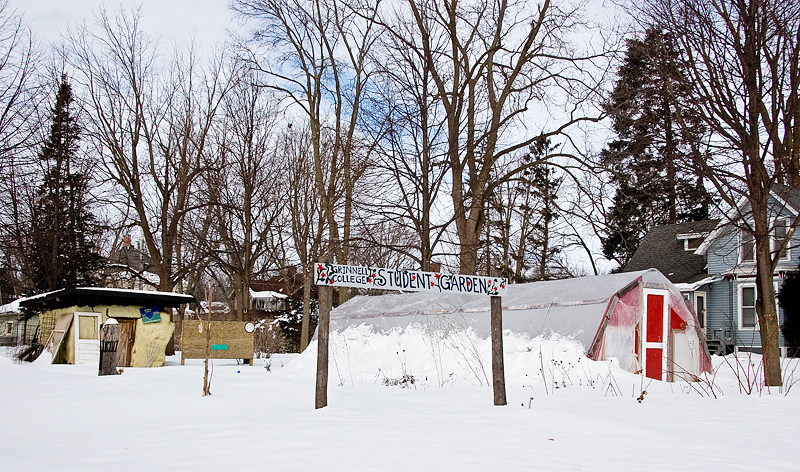By Tessa Cheek & Ali Sargent
This spring the Grinnell Area Local Foods Alliance (GALFA) re-convened for the first time in three years both to recognize the mobilization of the local foods movement in the Grinnell College community and to serve as a forum for local producers, consumers and eaters.
“The purpose of GALFA is to promote awareness of, and use of, locally produced food in the Grinnell community,” said GALFA founder Jon Andelson, Anthropology. The organization is highly community focused, and aims also to be community, as opposed to institutionally, driven.“[GALFA] is more of an informal group with producers, buyers and eaters,” Andelson said.

It is precisely GALFA’s purview to bring diverse groups of people with a unifying interest in local foods together, which makes the re-invigoration of the organization so important.
“The stake holders involved [in GALFA] are anybody from people working in…the government, to professors and people want to eat healthy food, to Kamal [Hammounda] at the Phoenix Café, to student groups on campus,” Kayla Koether ’12 said.
Each of the stake holders have something valuable to contribute to the local foods movement. GALFA exists, according to Andelson, “… to support existing initiatives and to promote new initiatives.”
For students, like those in Free the Planet or the Local Foods COOP, this kind of support includes increasing FTP’s ability to support sustainable and responsible farming, according to Koether, or the further support of Local Foods’ COOP’s increasingly large sales.
In addition to the implications GALFA will have on students, it may also serve to further engage Grinnell College’s Dining Services. Indeed, as awareness rises about the benefits of eating locally, Grinnell students quickly turn to their local provider of assumedly not so local food. In fact, Grinnell Dining Services has been a member of GALFA since the beginning—specifically with the annual GALFA summer intern.
Despite the dining services’ enthusiasm that GALFA has restarted, there are concerns. “One thing that concerned me when we went to this last GALFA meeting was that the room was full but it was full of students and buyers—not growers,” said Assistant Director of Grinnell Dining Services Terry Waltersdorf, who is involved in purchasing. “For GALFA to be effective we need to have growers.”
Both Waltersdorf and Director of Grinnell Dining Dick Williams point out that regardless of Dining Services willingness and desire to provide local foods, financial and logistical factors get in the way. They cite competition with other institutions—such as Iowa State University—as an issue. “Food is just not out there in quantities,” said Williams. “Everyone’s lining up to do this but there aren’t enough growers to provide the supply.”
Another limitation facing Dining Services’ budget. “Some of the growers would be willing to grow everything we need but at a cost that’s probably above what we can do,” said Associate Director of Dining Services Jeanette Moser. “Typically because it’s organic.”
Seasonality is also a factor, since Dining Services’ main months of operation are in the winter months when regional availability is limited. The Dining Hall defines “local” as being within an 85-mile radius, although according to Williams they do “swing out of that a little bit.”
If students are truly dedicated to eating locally they will have to make sacrifices—which may be easier said than done. “If I don’t have bananas down there right now I get yelled at,” said Waltersdorf.
But Dining Services is finding ways around these roadblocks—and they may be making a big announcement very soon. “They’re looking to make an agreement with a farmer to grow specific things for us,” said Moser. Williams emphasized that nothing has yet been confirmed.
GALFA is dedicated to supporting the kinds of relationships between consumer and producer which would allow the dining hall to stock more local food. “I do want to give [the dining hall] credit for as much as they have done and give them encouragement and support for doing even more,” Andelson said.
In addition to engaging and supporting the Grinnell College community as regards local foods, GALFA also aims to aid local farmers—most importantly, at the logistical level.
One of the difficulties which arises for local famers is the impossibility of both farming and marketing, when both are full time jobs. GALFA aims to alleviate some of this pressure by producing pamphlets and bulletins advertising local grower and their crops to local buyers.
Additionally, GALFA has begun work, with the Iowa Valley Resource Conservation and Development (RC&D) on centralizing the processing aspects of local farming.
“We’ve been talking about cold storage and light processing facilities for five years… our alliance with the Iowa Valley RC&D might be the way we’re going to make that happen,” Andelson said.
Providing this kind of service at the local level would allow farmers to store crops for longer and also process them in the ways many institutional buyers, like Grinnell College’s dining services and the Grinnell public school system, generally require.
This move to bring so many diverse, autonomous groups together might not be easy, but it certainly bears potential for innovation driven by a cohesive movement.
“I think we stop paying attention to where we are and by extrapolation stop caring for it,” said Andelson. “In the case of food, and in the case particularly of Iowa, we have such an opportunity to use locally produced food. Iowa has something like a quarter of the grade-A farmland in the United States, the soil here is phenomenally rich, and yet Iowa imports 80 percent of its food. There’s something wrong with that.”




















































